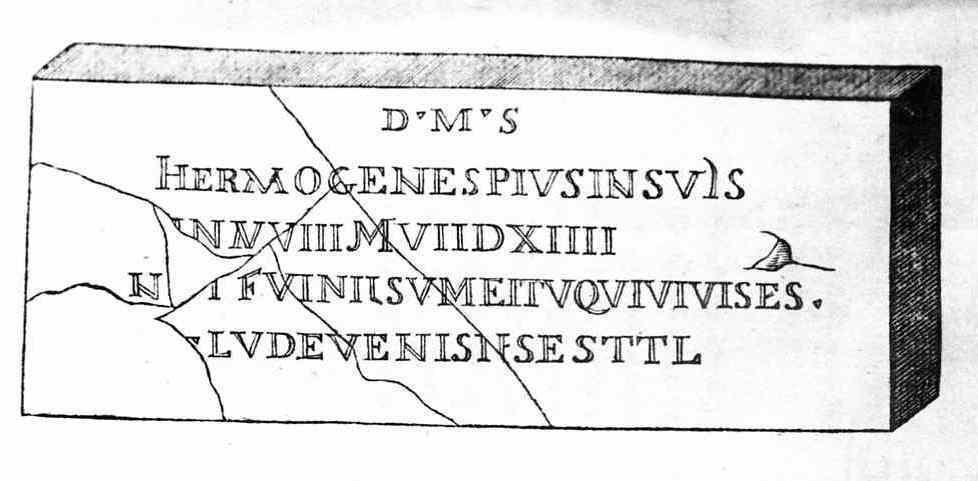Funerary inscription
Reference CIL II 1434; CLE ad 1500 | Description | Lyrics | Location | Chronology | Epigraphic edition | Translation | Apparatus | Comentary | Type of verse | Text divided into verses and metric signs | Images | Bibliography | Link to DB | Author |
Funerary inscription
Description
- Idno filename 22/01/0060
- Type of inscription: Sepulcralis
Location
- Place of discovery: Found in Tólox, Málaga, in a place called El Villarejo HÜBNER.
- Geolocation
- Location with Modern Nomenclature España / Málaga / Tolox
- Location with Old Nomenclature Hispania / Baetica / Gaditanus
Chronology
- Inscription's dating: Between year 100 and year 200
- Dating explanation: The typical formula from Baetica pius in suis and the abbreviation ann. point to the 2nd c. AD, uid. STYLOW 1995, 222-223.
Type of verse
- Type of verse: Dactílico (pentámetro)
- Verse/line correspondence: No
- Prose/verse distinction: Si
Epigraphic edition
D(is) ▴ M(anibus) ▴ s(acrum)
Hermogenes pius in suis
ạnn(orum) VIII m[ensium] VII d(ierum) XIII
n[i]ḷ fui nil sum et tu qui vivis es
5 [bib]e lude veni h(ic) s(itus) e(st) s(it) t(ibi) t(erra) l(evis)
Text divided into verses and metric signs
Et tu qui vivis es [bib]e lude veni. ll|ll|k||l[k]k|lkk|~
Translation
“Dedicated to the Manes. Hermogenes, delivered to his own, of eight years, seven months and thirteen days (is buried here). I was nothing, I am nothing; and you, who are alive: eat, drink, be merry, come”.
Bibliography
Conde y Herrera 1789–90, vol. 2, 137 (inde Carter 1777, 36–39, cum im. del. [inde Hübner, II 1434 {inde Bücheler, CLE ad 1500; Cholodniak 1904, 1282}]; Ceán-Bermúdez 1832, 337; Berlanga 1902, 379); Martín Camacho, CLEB ES, MA1, qui in linguam Hispanicam vertit. – Cf. Sanders 1991, 457–458; Hernández Pérez 2001a, 104–106.
Apparatus
3 XIIII CEÁN-BERMÚDEZ. – 4 n… CONDE Y HERRERA. – 5 bibe suppl. HÜBNER.
Comentary
Nil fui nil sum et tu qui uiuis es [bibe] lude ueni is the expression in prose of a fairly widespread formulaic sequence in Latin funerary epigraphy, and of which there are numerous variants recorded, both in prose and in verse (cf. CIL VIII, 3463; CIL X, 2070; CLE 1495; CLE 1559, etc). The sequence et tu qui uiuis es [bib]e lude ueni (ll|ll|k||l[k]k|lkk|~) can be scanned as a single pentameter, with lengthening of the syllable before the medial diaeresis. Examples of this expression in Hispania in CO12; CA11 and BA15, where the readers are also invited to enjoy life before death comes upon them, uid. Martín Camacho 2005.
The cognomen Hermogenes does not appear anywhere else in Hispania, cf. Abascal 1994b, 385, although it is well attested in other parts of the Empire, cf. Solin 2003, 57-59.
Author
- Author:J. Martín Camacho
- Last Update2023-11-20 15:44:30
You can download this




